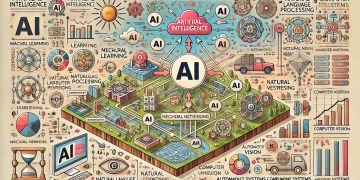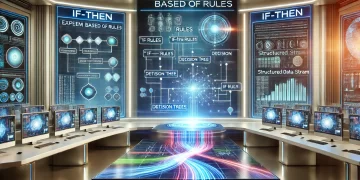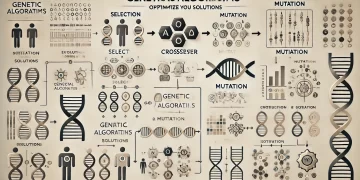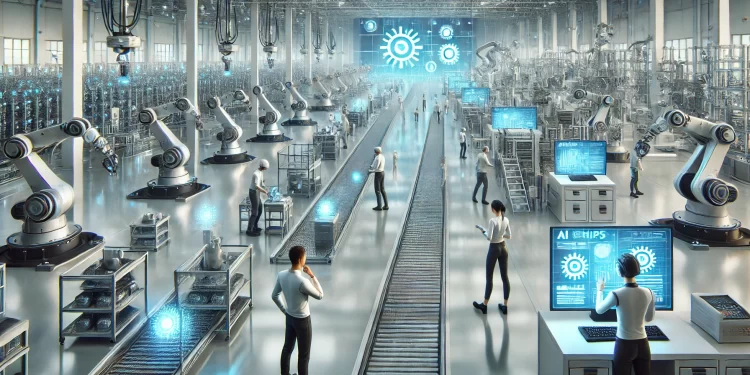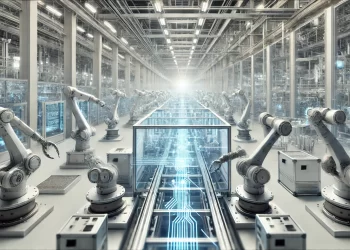Artificial Intelligence (AI) is revolutionizing the manufacturing industry by enabling smarter production processes, predictive maintenance, and enhanced efficiency. AI-powered solutions help companies optimize operations, reduce downtime, and improve product quality. This article explores various AI applications in manufacturing and their impact on the industry.
1. AI in Predictive Maintenance
One of the most significant AI applications in manufacturing is predictive maintenance. AI-driven sensors and machine learning algorithms analyze equipment data in real time to predict potential failures before they occur. This reduces downtime, lowers maintenance costs, and extends the lifespan of machinery.
2. AI in Quality Control and Inspection
AI-powered computer vision systems detect defects and inconsistencies in products with high precision. These systems use machine learning algorithms to analyze images and identify flaws in manufacturing processes. Automated quality control ensures that defective products are identified early, reducing waste and improving customer satisfaction.
3. AI-Driven Robotics and Automation
AI-powered robots are increasingly being used in manufacturing for tasks such as assembly, welding, packaging, and material handling. Collaborative robots (cobots) work alongside human workers, improving efficiency and safety. AI-driven robotic automation enhances productivity while reducing labor costs.
4. AI in Supply Chain Optimization
AI enhances supply chain management by predicting demand, optimizing inventory levels, and streamlining logistics. Machine learning models analyze historical data and market trends to improve forecasting accuracy, ensuring that manufacturers can meet demand without overstocking or understocking products.
5. AI in Smart Manufacturing and IoT Integration
The integration of AI with the Internet of Things (IoT) enables smart manufacturing, where connected devices communicate and make data-driven decisions. AI-powered IoT solutions collect and analyze real-time data from sensors embedded in machinery, optimizing production processes and improving operational efficiency.
6. AI in Production Planning and Scheduling
AI algorithms optimize production planning by analyzing factors such as machine availability, labor resources, and order priorities. AI-driven scheduling systems improve efficiency by minimizing bottlenecks and reducing idle time, leading to better resource utilization.
7. AI for Energy Efficiency and Sustainability
Manufacturers use AI to monitor energy consumption and optimize resource usage. AI-driven systems adjust production schedules to minimize energy waste, reducing costs and environmental impact. AI also aids in the development of sustainable manufacturing practices by optimizing material usage and minimizing waste.
8. AI in Human-Machine Collaboration
AI enhances collaboration between humans and machines by providing real-time insights and decision support. Augmented reality (AR) and AI-driven analytics assist workers in complex assembly processes, improving accuracy and efficiency. AI-powered digital assistants help employees access relevant information quickly.
9. AI in Mass Customization and Personalization
AI enables manufacturers to offer customized products tailored to individual customer preferences. AI-driven design and production systems analyze customer data to create personalized products efficiently. This allows companies to cater to diverse market demands without significantly increasing production costs.
10. AI in Cybersecurity for Manufacturing
With the increasing connectivity of manufacturing systems, cybersecurity has become a critical concern. AI-powered cybersecurity solutions detect and prevent cyber threats, protecting manufacturing infrastructure from data breaches and cyberattacks. AI-driven anomaly detection systems identify unusual network activity and mitigate risks in real time.
Conclusion
AI is transforming the manufacturing industry by improving efficiency, reducing costs, and enhancing product quality. From predictive maintenance and supply chain optimization to AI-powered robotics and smart manufacturing, AI-driven innovations are reshaping the future of manufacturing. As AI technology continues to evolve, manufacturers will unlock new opportunities for automation, sustainability, and customization.
References
- MIT Technology Review. (2023). “AI and the Future of Smart Manufacturing.”
- Forbes. (2023). “The Role of AI in Predictive Maintenance and Quality Control.”
- IEEE Spectrum. (2023). “AI-Driven Robotics and Automation in Manufacturing.”
- Harvard Business Review. (2023). “How AI is Optimizing Supply Chains and Production Scheduling.”
- The Verge. (2023). “The Impact of AI on Energy Efficiency and Sustainable Manufacturing.”
- Industrial AI Journal. (2023). “Enhancing Cybersecurity in Manufacturing with AI-Powered Solutions.”

